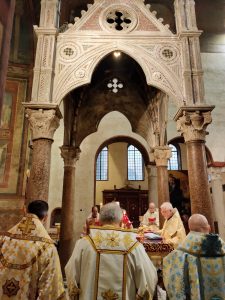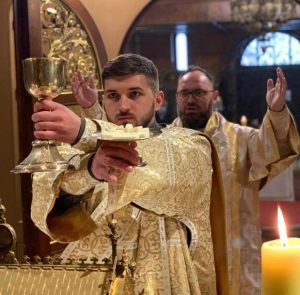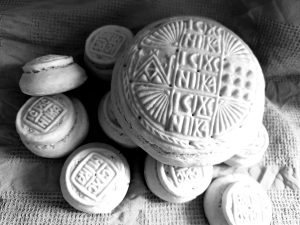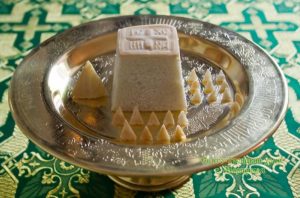Divine Liturgy and Melkite Calendar
 The heart of the community is the celebration of the Holy Eucharist. The message preached and shared –meaning, concretely, really, truthfully lived– is the Gospel of Jesus Christ. The Melkite Church maintains an historic continuity with the One, Holy, Catholic and Apostolic Church; she lives and preserves the faith and practices of the Faith as defined by the first seven Ecumenical Church Councils as well as the decisions from local Church councils that occurred through the years. We call ourselves Catholic because the faith is all over the world, taught by the bishops who are in communion with the Bishop of Rome. The word “Orthodox” is applied to our faith because it reveals the reality of being both “right believing” and “right worshipping”: it is the encounter with beauty of the Holy Trinity. We believe and experience the Melkite Catholic Church as the bearer of an uninterrupted Christian tradition expressed by true faith lived out in worship of God because the Melkite Church is a sure and certain path to Jesus Christ.
The heart of the community is the celebration of the Holy Eucharist. The message preached and shared –meaning, concretely, really, truthfully lived– is the Gospel of Jesus Christ. The Melkite Church maintains an historic continuity with the One, Holy, Catholic and Apostolic Church; she lives and preserves the faith and practices of the Faith as defined by the first seven Ecumenical Church Councils as well as the decisions from local Church councils that occurred through the years. We call ourselves Catholic because the faith is all over the world, taught by the bishops who are in communion with the Bishop of Rome. The word “Orthodox” is applied to our faith because it reveals the reality of being both “right believing” and “right worshipping”: it is the encounter with beauty of the Holy Trinity. We believe and experience the Melkite Catholic Church as the bearer of an uninterrupted Christian tradition expressed by true faith lived out in worship of God because the Melkite Church is a sure and certain path to Jesus Christ.
The Divine Liturgy
 As the Gospels and the writings of the Apostle Paul taught, the Last Supper, that is, the “night when He [Jesus] was betrayed” (I Cor. 11 :23), He instituted the Holy Eucharist, the sacrifice of the New Testament. The Lord wanted to perpetuate His sacrifice on the cross a “memorial” of His life, death and resurrection” until He comes again (I Cor. 11 :25-26). This memorial is known variously as the Breaking of the Bread, the Offering, or the Eucharist. As St. Augustine of Hippo said, the Holy Eucharist becomes a “mystery of piety, a sign of unity, and a bond of charity” (PL, 35, 1613). We know historically, the word “Eucharist” — eucharistia— meaning thanksgiving, in Greek. By the early years of the first century St. Ignatius of Antioch (d. AD 107) taught that what is done at the Liturgy, the Holy Eucharist, is what is commonly known by the faithful. He said, “Make an effort to meet more frequently to celebrate God’s Eucharist and thus offer to Him praise” (cf. Letter to the Ephesians, ch.13).
As the Gospels and the writings of the Apostle Paul taught, the Last Supper, that is, the “night when He [Jesus] was betrayed” (I Cor. 11 :23), He instituted the Holy Eucharist, the sacrifice of the New Testament. The Lord wanted to perpetuate His sacrifice on the cross a “memorial” of His life, death and resurrection” until He comes again (I Cor. 11 :25-26). This memorial is known variously as the Breaking of the Bread, the Offering, or the Eucharist. As St. Augustine of Hippo said, the Holy Eucharist becomes a “mystery of piety, a sign of unity, and a bond of charity” (PL, 35, 1613). We know historically, the word “Eucharist” — eucharistia— meaning thanksgiving, in Greek. By the early years of the first century St. Ignatius of Antioch (d. AD 107) taught that what is done at the Liturgy, the Holy Eucharist, is what is commonly known by the faithful. He said, “Make an effort to meet more frequently to celebrate God’s Eucharist and thus offer to Him praise” (cf. Letter to the Ephesians, ch.13).
 Later theologians of the Church speak of the the Eucharist as sacrament of the Church.
Later theologians of the Church speak of the the Eucharist as sacrament of the Church.
The common Greek word “liturgy” means any public function in the interest (i.e., something done on behalf) of the people. When applied by the community of faith the witness comes from The Septuagint –the ancient Greek Bible– the word “liturgy” means a sacrifice as a religious public service given to us through the Lord’s “priestly function” (Hebrews 8:6). It is THE privileged point of encounter with the Triune God (Father, Son, and Holy Spirit). What the bishop or the priest does is to pray the Liturgy on behalf of the people who are entrusted to his care. So, each Sunday the priest is enjoined to pray (to offer, to serve) the Liturgy for the people of the parish. The public ministry of the priest, hence, is the offering to God the Eucharistic sacrifice of the Body and Blood of our Lord Jesus Christ (cf. Letter of St. Clement of Rome, c. AD 96) for the forgiveness of sins and the recalling of what the Lord did with the Apostles in the Upper Room.
 The regular, communal prayer of the Melkite Church is on Sunday and it is a holy day. Why? We closely follow (that is, adhere to) the Third Commandment given to the Prophet Moses by God: keep holy the Lord’s Day. Plus, we do what our Savior did: worship God the Father. The authentic Christian tradition is to gather on the Day of the Resurrection (i.e., Sunday) to worship the Holy Trinity. For most of the year, hence, the Church prays the Liturgy of St. John Chrysostom.
The regular, communal prayer of the Melkite Church is on Sunday and it is a holy day. Why? We closely follow (that is, adhere to) the Third Commandment given to the Prophet Moses by God: keep holy the Lord’s Day. Plus, we do what our Savior did: worship God the Father. The authentic Christian tradition is to gather on the Day of the Resurrection (i.e., Sunday) to worship the Holy Trinity. For most of the year, hence, the Church prays the Liturgy of St. John Chrysostom.
For several weeks of the year, however, the Church prays the Liturgy of St. Basil the Great, bishop of Caesarea. Basil was the bishop there from AD 370 – 379. The prayers of the Liturgy of St. Basil are much longer than those of Chrysostom’s Liturgy which has a rich patrimony of theology and spirituality that will inform and form our spiritual life. St. Basil’s Liturgy is prayed ten times a year:
- The vigils of Christmas and Theophany
- The feast of St. Basil, January 1
- The first five Sundays of Lent
- Holy Thursday
- Holy Saturday.
On one or two days of the year, the Liturgy of St. James is prayed, typically on his feast day (October 23rd) and perhaps on the Sunday after the Nativity. It is derived from the Liturgy of the Church in Jerusalem. Generally speaking you will hear this Liturgy prayed by the Melkites and rarely among Slavs, due to the historical links between the Melkites and the Church in Jerusalem. In Eusebius’ Church History the James referenced was James, son of Zebedee, the brother of the Lord, and elected named the bishop of Jerusalem by the apostles.
The Melkite Liturgical Calendar 2022
The liturgical year of the Byzantine Church begins on September 1. In contrast, the Liturgical year of the Latin Church begins on the First Sunday of Advent.
Here are the Sundays. Holy Days, and important saints of the Byzantine Church year as given in the Melkite Church liturgical calendar:
January 1, Circumcision of our Lord
January 2, Sunday Before the Theophany of the Lord
January 5, Paramony (Vigil) of the Theophany of the Lord
January 6, Theophany of the Lord
January 9, Sunday after Theophany
January 16, Twelfth Sunday after the Holy Cross
January 23, Fifteenth Sunday after the Holy Cross
January 30, Sunday of the Canaanite Woman
February 2, Encounter of our Lord
February 6, Sunday of the Pharisee and the Publican
February 9, Leave-taking of the Encounter
February 13, Sunday of the Prodigal Son
February 19, Saturday of the Dead
February 20, Sunday of Meat-fare
February 27, Sunday of Cheese-fare
February 28, Great Fast (Lent) begins
March 6, Sunday of Orthodoxy
March 13, Sunday of the Holy Relics and St. Gregory Panamas
March 20, Sunday of the Holy Cross
March 27, Sunday of our Father John Climacos
March 31, Thursday of Repentance
April 2, Saturday of the Acathist Hymn
April 3, Sunday of St. Mary of Egypt
April 9, Saturday of Lazarus
April 10, Palm Sunday
April 11, Great and Holy Monday
April 12, Great and Holy Tuesday
April 13, Great and Holy Wednesday
April 14, Great and Holy Thursday
April 15, Great and Holy Friday
April 16, Great and Holy Saturday
April 17, Holy Resurrection
April 18-23, Bright Week
April 24, Sunday of St. Thomas
April 30, Apostle James, Brother of John the Evangelist
May 1, Sunday of the Ointment Bearing Women
May 8, Sunday of the Paralytic AND Apostle and Evangelist John the Theologian
May 11, Mid-Pentecost
May 15, Sunday of the Samaritan Woman
May 22, Sunday of the Man Born Blind
May 25, Leave-taking of Easter
May 26, Feast of the Ascension
May 29, Sunday of the Fathers of Nicea I
June 3, Leave-taking of the Ascension
June 4, Saturday of the Dead
June 5, Sunday of Pentecost
June 6, Monday of the Holy Spirit
June 11, Leave-taking of Pentecost
June 12, Sunday of All Saints
June 13, Traditional Beginning of the Apostles’ Fast
June 16, Feast of the Divine Body
June 19, Second Sunday after Pentecost
June 20, Beginning of the Apostles’ Fast (Melkite usage)
June 23, Visitation of the Theotokos to her Cousin Elizabeth
June 24, Nativity of the Fore-runner, John the Baptist
June 26, Third Sunday after Pentecost
June 29, Apostles Peter and Paul
June 30, Synaxis of the Twelve Apostles
July 1, Wonderworkers Cosmas and Damian
July 2, Deposition of the Mantle of the Mother of God
July 3, Fourth Sunday after Pentecost
July 10, Fifth Sunday after Pentecost
July 17, Sunday of the Fathers of the First Six Ecumenical Councils
July 20, Prophet Elias the Thesbite (Blessing of cars)
July 22, Perfume-bearing Woman Mary Magdalen
July 24, Seventh Sunday after Pentecost
July 27, Great-Martyr Panteleimon the Physician
July 31, Eighth Sunday after Pentecost
August 1, Procession of the Life-giving Cross AND Beginning of the Theotokos’ Fast
August 6, Transfiguration of our Lord
August 7, Ninth Sunday after Pentecost
August 13, Leave-taking of the Transfiguration
August 14, Tenth Sunday after Pentecost and Vigil of the Dormition
August 15, Dormition of the Mother of God
August 21, Eleventh Sunday after Pentecost
August 28, Twelfth Sunday after Pentecost
August 29, Beheading the Fore-runner John the Baptist
August 31, Deposition of the Cincture of the Theotokos in Calcoprateia
September 1, Church’s New Year, Father Simeon the Stylite and Synaxis of the Theotokos
September 4, Thirteenth Sunday after Pentecost
September 6, The Miracle of the Archangel Michael at Colossae
September 8, Nativity of the Mother of God
September 9, Ancestors of Christ Joachim and Ann
September 10, Saturday Before the Holy Cross
September 11, Sunday Before the Holy Cross
September 13, Dedication of the Basilica of the Resurrection
September 14, Exaltation of the Cross
September 18, Sunday after the Holy Cross
September 21, Leave-taking of the Exaltation of the Holy Cross
September 23, Conception of the Forerunner
September 25, First Sunday after the Holy Cross
September 26, Apostle John the Theologian (repose)
October 1, Protection of the Mother of God
October 2, Second Sunday after the Holy Cross
October 9, Third Sunday after the Holy Cross
October 16, Fathers of the Second Council of Nicea
October 18, Apostle Luke the Evangelist
October 23, Sixth Sunday after the Holy Cross AND Hieromartyr James, 1st Bishop of Jerusalem
October 30, Fifth Sunday after Holy Cross
November 1, Martyrs, Wonderworkers and Physicians Cosmas and Damian
November 6, Seventh Sunday after the Holy Cross
November 8, Synaxis of the Archangels Michael and Gabriel and all the Heavenly Powers
November 13, Eighth Sunday after the Holy Cross and Father John Chrysostom, Archbishop of Constantinople
November 15, Beginning of the Traditional Nativity Fast
November 16, Apostle Matthew the Evangelist
November 20, Ninth Sunday after the Holy Cross
November 21, Entrance of the Mother of God into the Temple
November 27, Thirteenth Sunday after the Holy Cross
November 30, Apostle Andrew, the First Called
December 4, Tenth Sunday after the Holy Cross AND Great-martyr Barbara
December 6, Father Nicholas the Wonderworker
December 9, Maternity of Ann
December 10, Beginning of the Nativity Fast (Melkite usage)
December 11, Sunday of the Forefathers
December 18, Sunday before the Nativity of the Lord–Genealogy of the Lord Sunday
December 23, Paramony (Vigil) of the Nativity
December 24, Saturday before the Nativity of our Lord
December 25, Nativity of our Lord
December 26, Synaxis of the Mother of God
December 27, Protomartyr Archdeacon Stephen